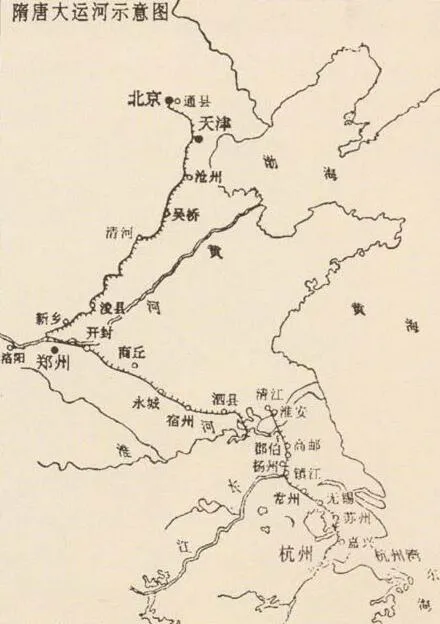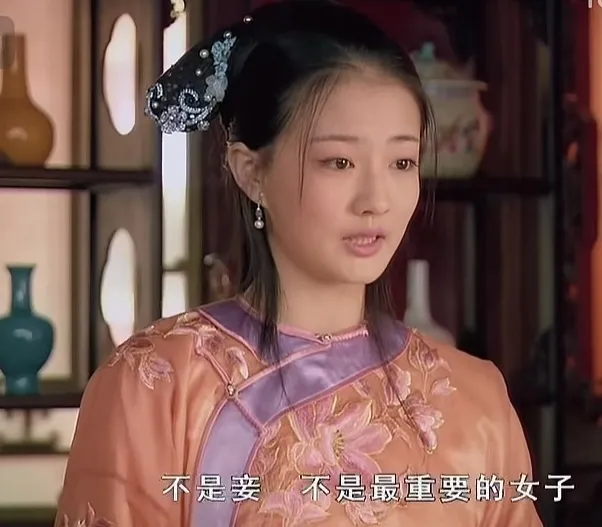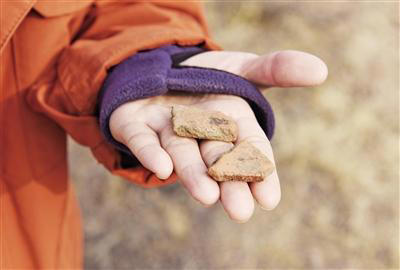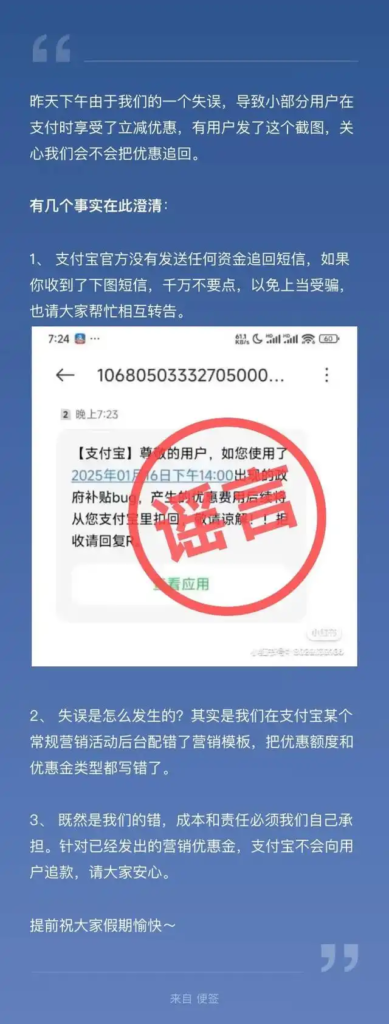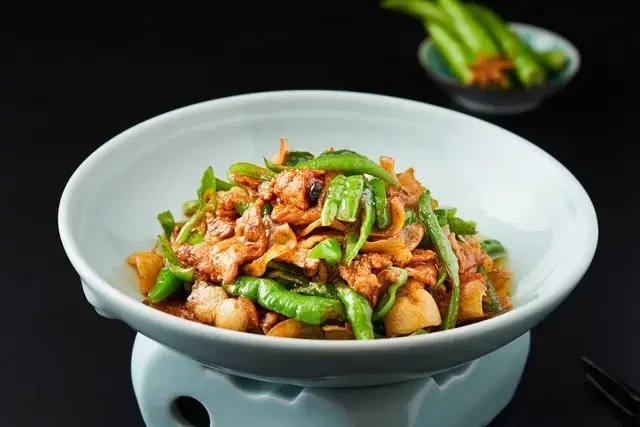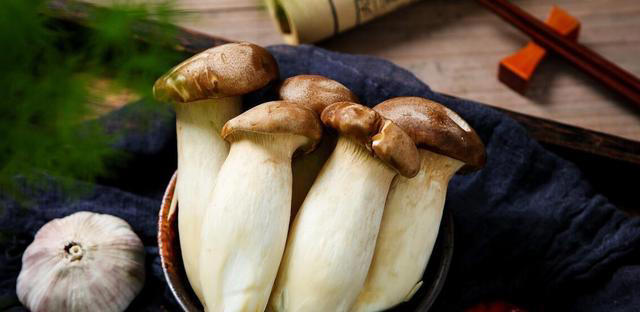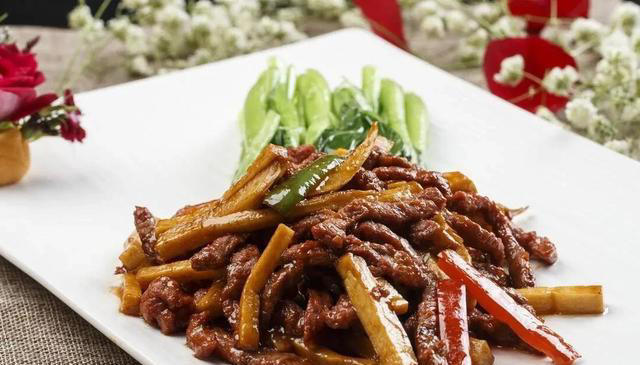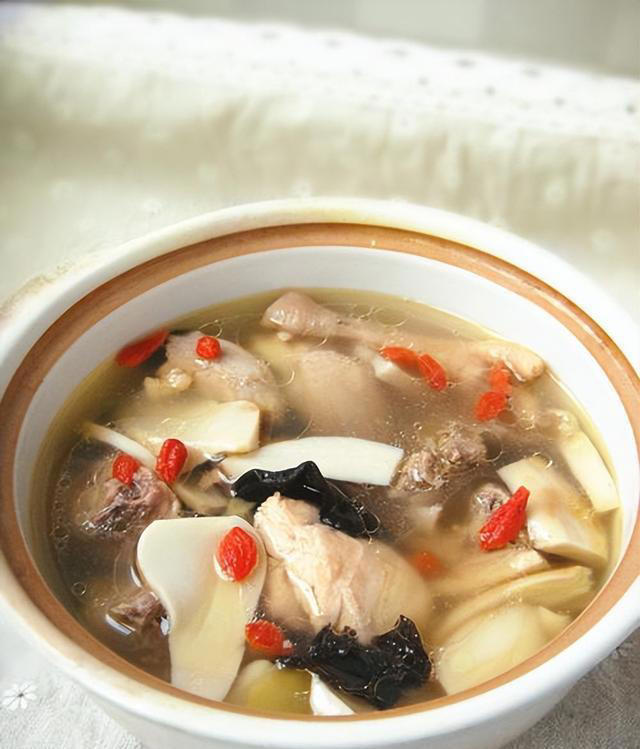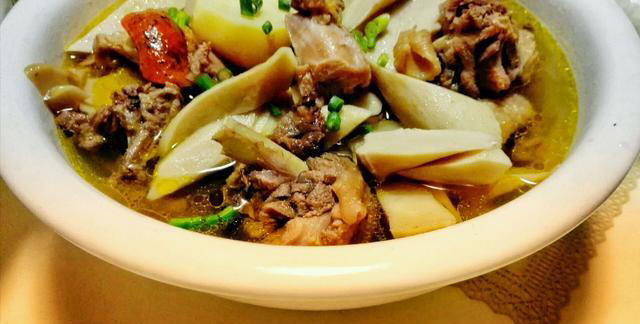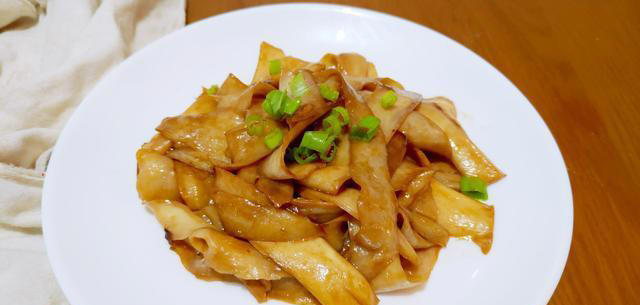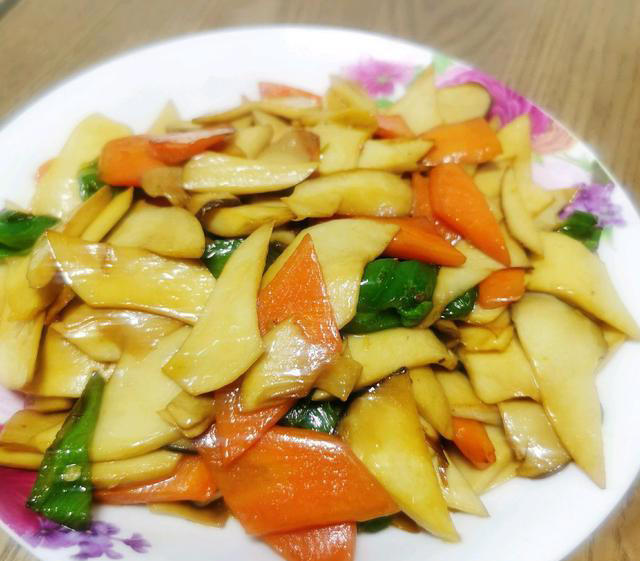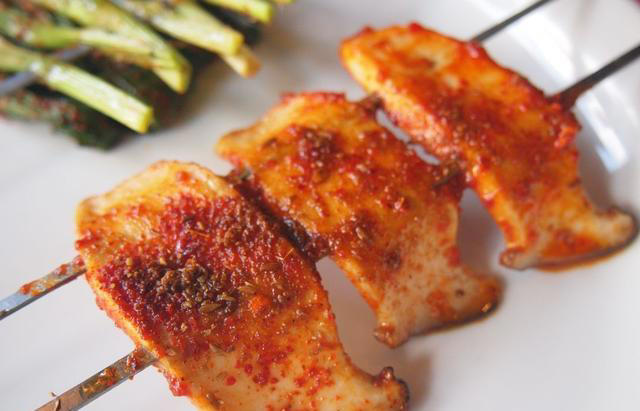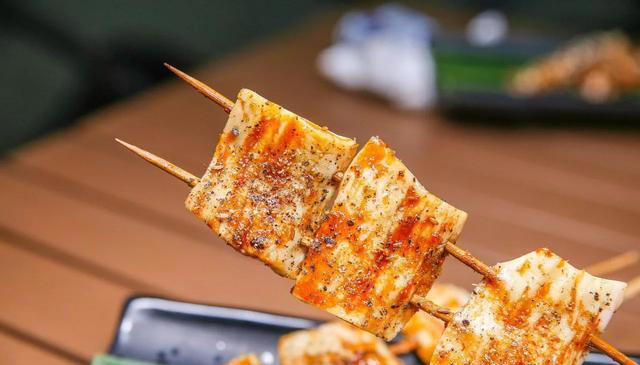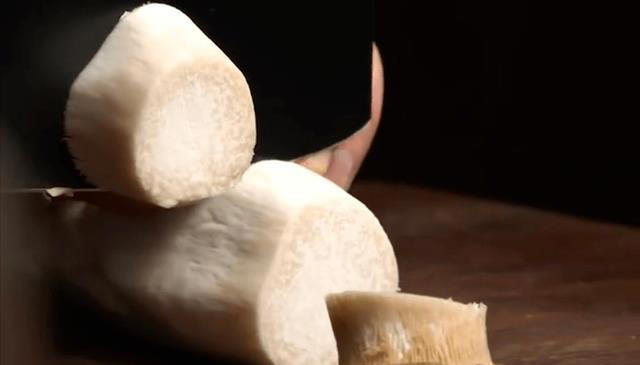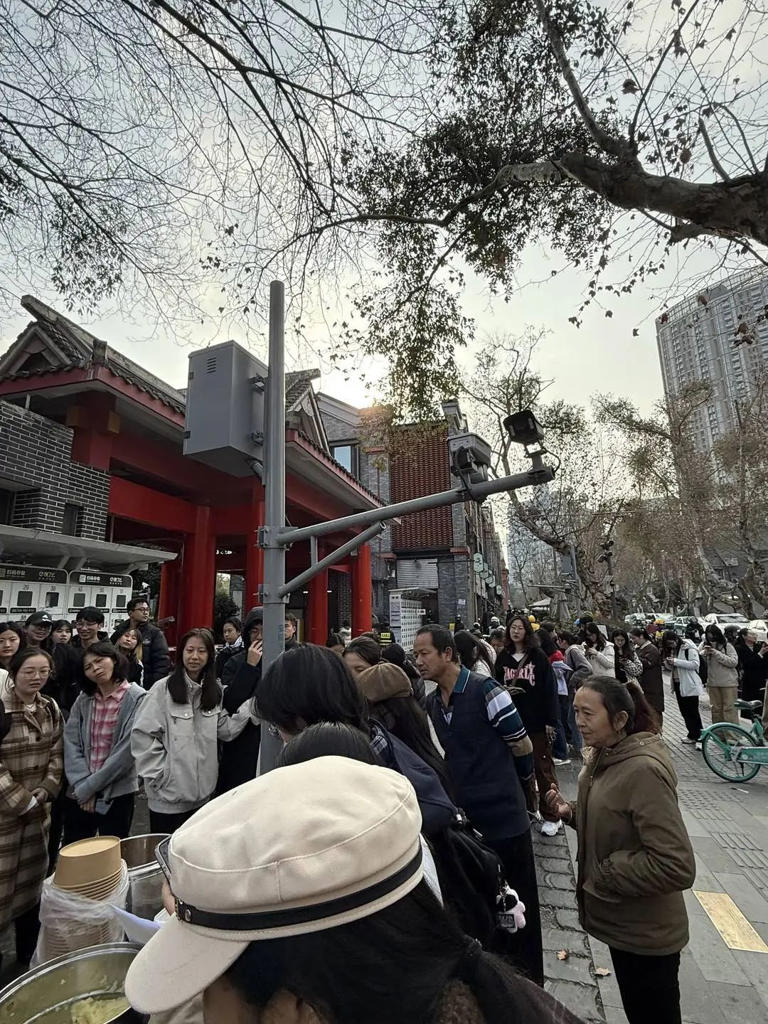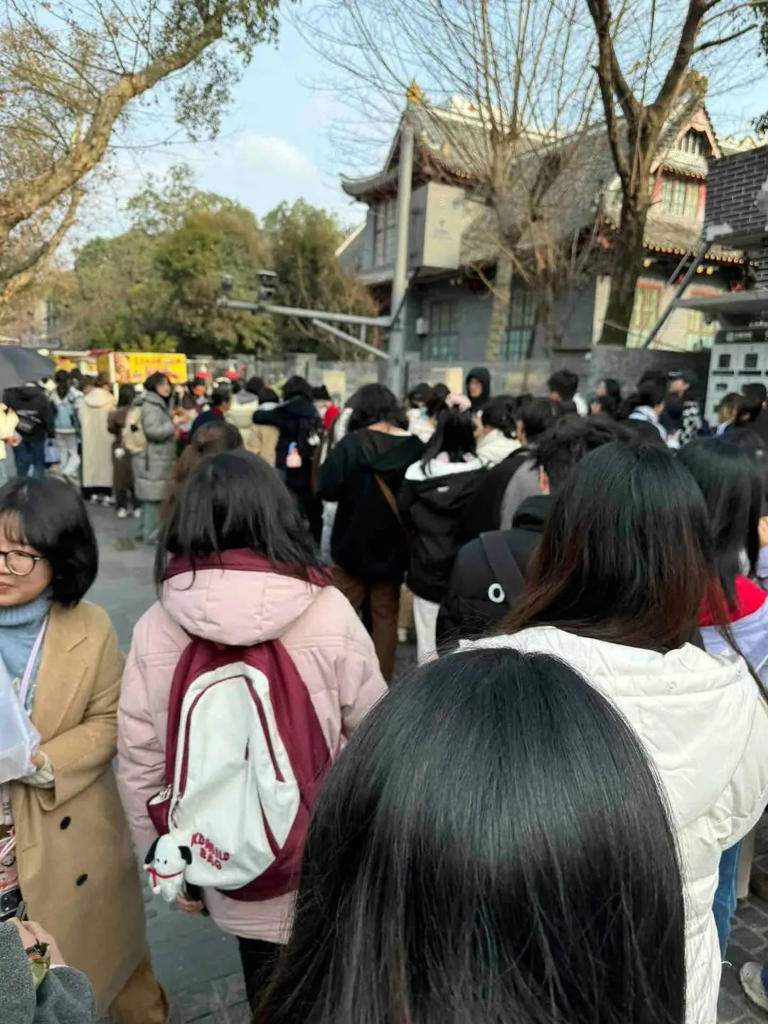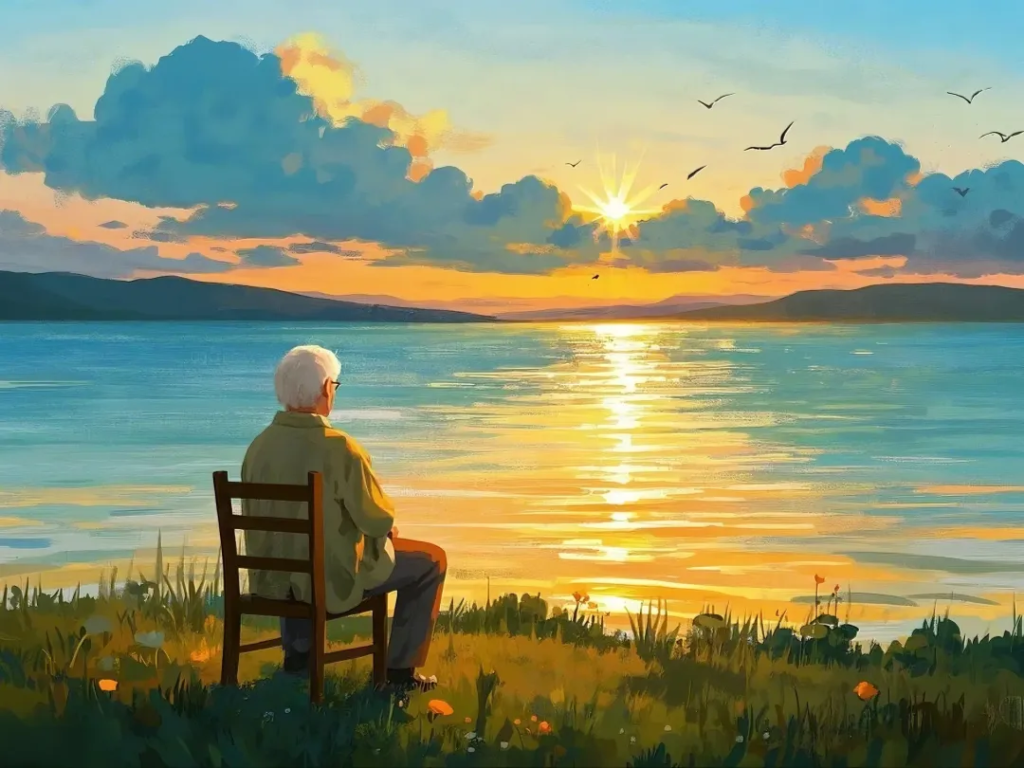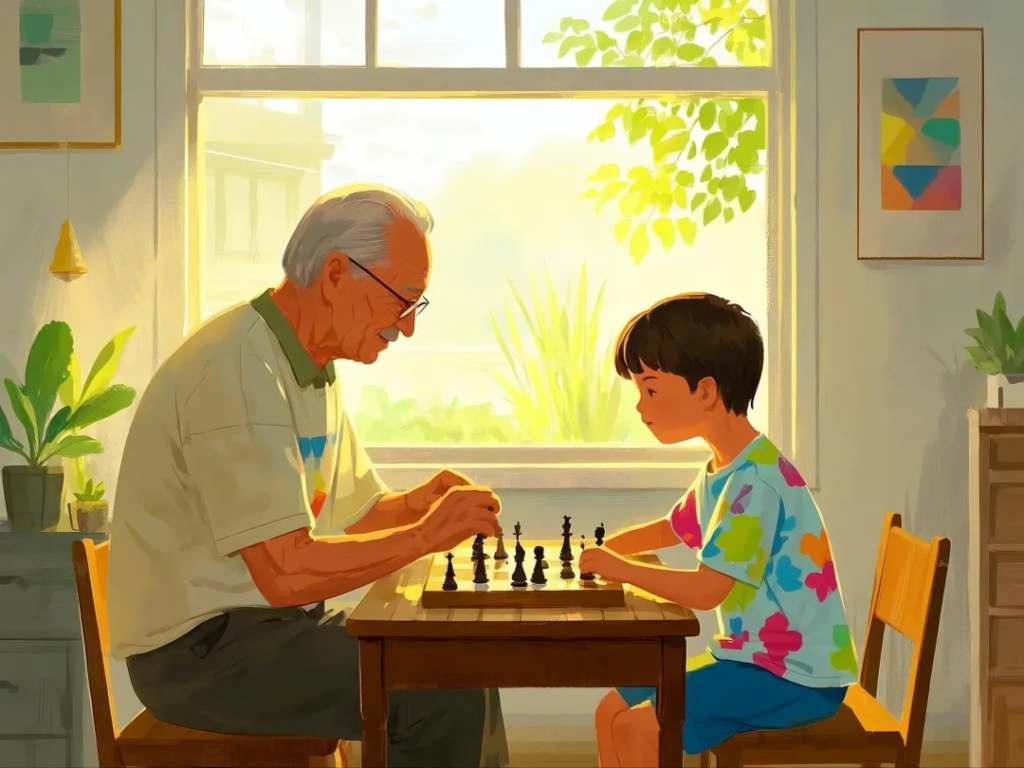In that year, there appeared two young people who came to play by the Xianyou Lake in Nanshan, Shaanxi Province. The older one pointed to the stone wall on the other side of the pool and said that we would go over and write on it – to reach it we had to step over a narrow crossbar. Below the crossbar is the abyss. The young man looked over the crossbar, looked into the abyss, thought for a moment, and shook his head. So the older man walked calmly by himself, then tied a rope to his waist and a tree, climbed up the stone wall, wrote six words with a pen, and then walked back. The younger one exclaimed:
“Man, you sure can kill!” The older one asked why, and the younger one replied:
“People who don’t care about their own lives can certainly kill people.”
They both laughed.
And not far from them, on the stone wall, were written six words:
“Zhang Dun and Su Shi are coming to swim.” It was Su Shi who dared not go over, and it was Zhang Dun who wrote both their names on the stone wall and came back.
That year, they are less than 30 years old, have just entered the official career, each made a small official. The two admired each other and were on good terms. But at that time, Su Shi would not have thought that the person Zhang Dun would kill in the future was himself.

The beginning is quite like Jin Yong, the end looks like a small story of Gu long, in the Southern Song Dynasty scholar Zeng 慥 notes “High Zhai Rampage”. Notes, some true, some false. But this story has always been frequently cited, and even included in the “History of Song”, probably because the character of Zhang Dun reflected in this story is really accurate. Another true historical fact is: in the second year of Jiayou (1057), Zhang Dun and Su Shi ranked high school Jinshi together. Su Shi coincided with the death of his mother and could only return to his hometown to wake up, and Zhang Dun also failed to get this “Jinshi” title – he gave it up himself. The reason is simple: Zhang Heng, one of Zhang Dun’s nephews, won the first prize this time. Although he was also a Jinshi, he did not do well in the exam as the younger generation, which made Zhang Dun feel very ashamed and simply gave up the qualification.
Two years later, Zhang Dun went to Beijing again to take the examination and was satisfied only when he got a first grade and the fifth place. Regard fame as the most important thing, regard scientific research as a prize – the former shows Zhang Dun’s character, the latter shows Zhang Dun’s talent.
Therefore, although Su Shi and Zhang Dun were scholars of the same discipline, they did not know each other at that time.
Two people began to communicate, to wait for Su Shi wake back, put a Fengxiang house to sign (probably equivalent to a county machine administrative agency secretary general). At that time, Zhang Dun served as the magistrate of Shangluo County, which was not far from Su Shi. Two young and promising reserve cadres, were already attracted to each other, so they began to meet, get acquainted, and even travel together – the story of two people traveling to Xianyoutan should happen during this period. Su Shi trusted Zhang Dun very much. At that time, his brother Su Zhe was going to take up a post in Shangzhou, and Su Shi also consulted Zhang Dun specifically, and then wrote a poem to his brother, the first sentence is:
“Recently from Zhangzi Wen Qu said, bitter road merchants want you to come.” “Zhang Zi” is Zhang Dun, this is the first time that Su Shi wrote Zhang Dun into his poem.
Officialdom is like a huge machine, and the Jinshi are like tiny parts. After being placed into this big machine, they start to operate according to their own fate gears and come to different positions and play different roles over time.
When Su Shi was still a grass-roots cadre, Zhang Dun took the lead. In 1069, Emperor Shenzong of the Song Dynasty put Wang Anshi in power and began to reform the law. With sharpness, eloquence, ability, and courage, Zhang Dun immediately got Wang Anshi’s appreciation, began to rise all the way, and eventually rose to the top position in charge of finance in the central government. Su Shi did not completely oppose the new law, only disagreed with those radical and unreasonable aspects of it, but was generally considered to be firmly opposed to the school of Sima Guang. Although the Tao was different, it did not affect the friendship between Su Shi and Zhang Dun. At that time, although Zhang Dun was in a high position, he did not forget Su Shi at the grassroots level, and the two people would exchange letters and greet each other.
Soon after, because of party struggles, Zhang Dun was demoted from the central government and put into the governor of Huzhou. Before he was demoted, Zhang Dun sent a poem to Su Shi, the last line being:
“One day the boat will come and go, and the poem wine will be apxiqiao fishing.” Frustrated Zhang Dun, the first thought is sushi, even if the initiation of retreat, he felt the most able to know his spiritual partner, is also Sushi.
After Su Shi received Zhang Dun’s poem, he also replied to two poems, one of which is:
“Early to break the heart together, he met the words are long.” Not only resonated with Zhang Dun, but also recalled the years when the two traveled together as grassroots cadres, and looked forward to meeting each other in the future.
It can be seen that although the two people were in different positions and had different political views, their friendship was still deep.
At that time, Su Shi, who had been accustomed to relegation, could still comfort Zhang Dun, who had just tasted it.
But soon, Su Shi ushered in the biggest disaster of his life.
In 1079 AD, the “Wutai Poetry Case” against Su Shi broke out.
A series of rumors about Su Shi’s poetry eventually accumulated into a huge stone, to press Su Shi to pieces – some people, is to Su Shi’s life. Among them, the current prime minister Wang GUI can be said to be a leading figure. In order to add another stone to the body bag containing Su Shi, he revealed another poem of Su Shi to Emperor Shen of Song. There is a sentence in the song “Wang Fu Xiucai lived in double Hui, two first and one” :
“There is no root to the nine springs, only the world knows the dragon.” Originally, Su Shi’s original intention to praise perseverance and unyielding, but Wang GUI misinterpreted it as an allusion to the Son of Heaven: the emperor should be the flying dragon in heaven, Su Shi he was vicious compared to the underground “stung dragon”, what is the intention? This obviously far-fetched attack, even the Song Shenzong was a little hard to listen to, but because Wang GUI was the head of the officials, no one dared to disagree. At the critical moment, it was Zhang Dun who stood up. At that time, Zhang Dun, who had just finished his mother’s funeral, was recalled to the court, that is, an imperial scholar, and his feet had not yet stood firm. But to see his friends being so attacked, he felt unbearable, when the court stood up and Wang GUI positive hard gang, to help Su Shi speak, and after retiring from the court still stopped Wang GUI to ask: “You do this, is to let Su Shi’s family break down?” Wang GUI says: “This is the supervisor Shu 亶 said.”
Zhang Dun snorted, “Do you also eat that 舒亶 saliva?” After this, Zhang Dun could not help complaining to others about Wang GUI: “When people frame others, they can be so reckless!” It should be said that for Zhang Dun, who wanted to make progress in politics, it was still a considerable political risk to take such a public side to support Su Shi in the undercurrent of the court. To some extent, he would rather give up his own political future and help his good friend Su Shi. In the end, Su Shi got away from the “Wutai poem case” and was demoted as a deputy of Huangzhou Tuanlian without real power. Such an obvious loss of power also led to Su Shi’s cold house, and many of his original hot friends no longer contacted him. But when he was most lonely and depressed, it was still Zhang Dun, ignoring the eyes and opinions of others, who wrote to him to comfort him.
Su Shi was deeply moved by this gesture, which can be seen from his reply to Zhang Dun:
“Shi has not dared to return to personnel since he offended, although he is close relatives, he has not been willing to have a word.” When I was suddenly given a book, I had a lot of questions, deep sorrow and love, and lamented not at all.”
And Zhang Dun gave more than spiritual relief, Su Shi himself admitted: “… Once there is trouble, there is no sorrow. But son thick (steamed bread note: Zhang Dun word son thick) flat living left me with medicine, and urgent and have to receive the shirt, really different from the secular.”
Zhang Dun’s move to provide timely help also made Su Shi sincerely sigh: “Son thick Qiwei peerless, since he is a generation of inhuman.” As for the fame of the general, that is the rest.” If the original Su Shi and Zhang Dun were just scholars who admired each other, after experiencing the Wutai poem case, these two people can be said to be friends in need. If the story ended there, it would be a good one. But the gears of fate, once turned, are hard to stop.
In 1085 AD, Emperor Shenzong died, and the sky over the Bianliang City was once again surging. Emperor Zhezong of the Song Dynasty was young, and Empress Dowager Gao Tai ruled from behind a curtain. Gao had always opposed the new law, so he revived a set of old party figures, the core of which were three: Sima Guang, Su Shi, and Su Zhe.
After suffering from relegation, Su Shi returned to the center of power and was extremely favored.
Corresponding to this, Zhang Dun, who was originally in a high position, began to falter. In the early days of Zhe Zong’s reign, there was a brief stalemate between the old and new parties. But Zhang Dun knew in his heart that the reform party had lost the emperor’s support. However, in order to maintain some of the results of the reform, he still chose to come forward and re-enter the center of power Sima Guang in the court of public debate. Sima Guang, who was not good at debating, was no match for the quick-thinking and eloquent Zhang Dun, and he was so defeated that he had to entrust Su Shi with a message asking Zhang Dun not to humiliate him publicly – which shows how vicious Zhang Dun’s mouth was, and also shows that at that time, Su Shi and Zhang Dun had a good relationship. But gradually, as the attitude of the Empress Dowager Gao became more and more obvious, the position of the new party began to decline sharply, and the primary target of the collective fire attack was naturally Zhang Dun. There was a flood of complaints against him, many of them vicious. He had been mentally prepared for the storm long before, but one of the events broke his defenses completely in an instant. It was Su Shi’s younger brother, Su Zhe, who submitted a souvenir: “Begging Zhang Dun to know the Privy Council.” In the memorial, Su Zhe made it clear that in order to prevent Zhang Dun from harming the country again, he should be dismissed from his post as privy councillor (equivalent to minister of defense).
The dispute of views can be understood, and personal attacks are prepared, but Zhang Dun never expected that in his most difficult moment, the person who participated in the sinking of the stone actually had a scheme. The whole world knows that the relationship between Su Zhe and Su Shi brothers is extremely close, Su Zhe participated in my Zhang Dun, completely did not take into account your brother Su Shi and my friendship? And Su Shi, you really did not know anything about it beforehand? Linton’s reasoning was not contrary to logic.
After Su Zhe’s sonata was handed up, Su Shi did not make any comments and remained silent. Should Zhang Dun not be able to accept the fact that in the “Wutai poem case” of that year, I risked my political career to guarantee you, in exchange for you treating me like this now? Five days after Su Zhe’s performance, Zhang Dun collapsed. He was deposed as a privy council, expelled from the court and banished to Ruzhou. And at this time, someone else repaired a knife to Zhang Dun, and the person who repaired the knife was Su Shi. If last time it was Su Shi watching his brother lift the knife, this time, the person holding the knife handle became himself – he also played a memorial. In this “Turning over the Head of Shen Qi”, Su Shi accused Wang Anshi of “seeking marginal merit and disregarding human life”, and in turn hitched a hand to Zhang Dun, saying that he had recruited the Wuxi border people (ethnic minorities in the western Hunan region), which had intensified the “animosity and barbarism, and the military disaster.” The background of this matter is that Wang Anshi and Zhang Dun have always advocated taking a tough attitude towards the Western Xia and other countries on the border and not giving up an inch of land, while Sima Guang’s faction argued that it was not appropriate to wage war and could even give up land for peace. Su Shi supported Sima Guang on this point, opposed Wang Anshi, and inevitably brought into Zhang Dun.
In fact, from the current perspective, Zhang Dun’s acceptance of the Wuxi border people, the expansion of the Northern Song territory and the increase of tax revenues made sense both emotionally and logically, and Zhang Dun was quite pleased with this at that time. But Su Shi, who wrote a poem praising Zhang Dun for his “fame and fame who won three victories in a row”, now says these words when people are in distress, and how Zhang Dun feels can be imagined. Losing his position, Zhang Dun had no power to fight back under the attack of the old Party’s “combination fist”, and could only ask for his dismissal from office and raise the Lingxiao Palace – to manage a Taoist temple in Hangzhou. It was a retirement position for the retired chancellor. Later, Zhang Dun’s father died, and during the wake, the old Party still did not stop attacking him.
At this time, Zhang Dun, but live out the free and easy Su Shi, he in a poem so self-deprecating: “Cave in the palace of an idle man, east house west axis old minister.” But Zhang Dun is not Su Shi after all. He was the one who dared to walk across the single-log bridge to inscribe, and was thought by Su Shi to “dare to kill”. It was not peace that bred in him, but vengeful resentment. And all he had to wait for was the moment.
In 1093, Zhang Dun’s chance came. The 71-year-old Empress Dowager Gao Taihuang died, and the 16-year-old Emperor Zhezong took over the throne. The young son of heaven is very disgusted with the set of the old party, and once he has the power, he immediately begins to overthrow all the arrangements of his grandmother, expel the old party, and restart the new party.
Zhang Dun, who had been ready to spend the rest of his life, was re-employed as prime minister.
After returning to the phase, Linton set about restoring a series of new laws that had been abolished before, and at the same time, he did not forget one thing: revenge.
In fact, just as Zhang Dun was about to become prime minister, various kinds of sonatas attacking the old Party had already begun to be presented, and most of the sonatas were performed on a fixed object – Su Shi. The court and the people all knew who Linton hated the most in his heart.
And as early as before Zhe Zong to take power, the political sense is not sensitive Su Shi rare fine behaved once, he wrote a request to resign from all the imperial posts, including the Ministry of Rites Shang Shu, and put out to be a local official.
Su Shi had foreseen that a storm was coming against him, but he did not expect that the storm would come so violently.
With the participation of one after another, Su Shi was quickly removed from all his central posts – I don’t think it was you who resigned, but he was – originally going to be an official in Dingzhou in Hebei Province, and now he is being transferred to Yingzhou in distant Guangdong Province.
The 57-year-old Su Shi is still on his way to Yingzhou, and the additional order comes again: people like this “big crime is light”, or light punishment, don’t go to Yingzhou, go further south to Huizhou! It was not only the demeaning officials who were near exile that caused Su Shi trouble. He found that wherever he went, any local officials who gave him a warm reception or help would soon be demoted or transferred; And the senior officials sent by the court to visit his place, without exception, were all his enemies at that time.
In other words, someone not only wants to screw him, but also wants to use someone else’s hand to screw him.
In fact, Su Shi’s heart is very clear, who is the hand behind all this. Because all the relegation against a group of “Yuanyou Party people” such as Su Shi must eventually be approved by a person. Yes, it is Zhang Dun, who occupies a high position as prime minister. But perhaps out of a free and easy mentality, or perhaps a stubborn idea, Su Shi never bowed his head and begged forgiveness, but showed a happy-go-lucky and can enjoy the state of mind.
For example, in Huizhou, he spent nearly a year to build his new house, not only “three hundred lychees a day”, but also wrote a pleasant sentence: “Report Mr. Spring sleep beauty, Daopeople light play five more clock.” The passage of such verses to Linton’s desk was undoubtedly a silent demonstration. So, again demoted, demoted out of the mainland, across the sea to Danzhou!
But even so, Su Shi still did not ask for forgiveness, but recognized his hometown:
“I was originally a daner, parasitic West Shu Zhou. To cross the sea suddenly is like going on a long journey.” At this time, the grudge between the two people has actually become a race against time. Given enough time, there will always be changes.
In 1100 AD, Emperor Zhezong of the Song Dynasty died without an heir at the age of 25. According to the idea of Chancellor Zhang Dun, according to the etiquette, either Zhe Zong and his mother and brother Wang Jian Zhao, or Zhe Zong’s elder brother Wang Shen Zhao 佖 – even if he had an eye disease. However, Empress Dowager Xiang was attracted to the eleventh son of Song Shenzong and the second brother of Song Zhezong, the versatile king of Duan Zhao Ji, who could write and paint well. Zhang Dun strongly opposed, in a hurry, said the famous sentence:
“The end king is frivolous, can not be king of the world.” Whether this sentence really came from Zhang Dun’s mouth has been debated in later generations, but it is beyond doubt that Zhang Dun opposed the establishment of King Duan.
When Song Huizong ascended the throne, Zhang Dun lost all official posts in the dynasty and was demoted to Yuezhou, next, his fate was the same as Su Shi, he was constantly participating in the “big crime and light responsibility”, resulting in the relegation layers on layers: deputy minister, deputy minister… When Su Shi was demoted to the title of An, Zhang Dun also tasted again.
At one point, Zhang Dun was banished to Leizhou, the remote place to which he had banished Su Shi’s younger brother Su Zhe. Across the Strait was Su Shi, whom he had banished to Danzhou.
Official circles all over the country are spreading the word that Su Shi’s return is definitely to be re-used, and it is very likely that he is going to worship in the hall.
On his way back to the north, Su Shi received a special letter.
The letter was written by a man named Zhang Yuan — he was the son of Zhang Dun. Zhang Yuan was also a scholar, and in the year of his entrance examination, the chief examiner was Su Shi, so strictly speaking, Su Shi was also Zhang Yuan’s teacher. Zhang Yuan’s letter is diplomatically written, but his appeal is clear at a glance:
My father has wronged you in the past, and if you return to a high position in the court, please do not retaliate against him. When he received Zhang Yuan’s letter, the 64-year-old Su Shi was already seriously ill. But he still strong spirit, pick up a pen to Zhang Yuan reply. A paragraph on the top, in fact, let Zhang Yuan put his heart down: “A certain and the prime minister will be friends for more than 40 years, although the middle source is slightly different, the friendship is solid without increasing loss.” Hear its high year send trace in the sea, this huai know; But what has been beneficial in the past is only a matter of what has not happened.” Although Zhang Dun had long been relegated to the dust, Su Shi still honored him as “Prime Minister” in his letter. For the demotion and persecution that affected him for half his life, Su Shi only used four words to describe it: “The source is slightly different.” Then he showed his attitude: the past has passed, don’t mention it.
In that letter, Su Shi was more concerned about Zhang Dun’s physical health, told Zhang Yuan that they should bring more medicines to visit their father, reminded Zhang Dun who liked Daoshu never to take alchemy outside, and gave him several prescriptions, hoping that he would take a good rest and take care of himself.
This letter has been treasured by the descendants of the Zhang family. But there is no existing historical record, Zhang Dun later wrote to Su Shi.
The two still have not resumed direct contact.
A month later, Su Shi died in Changzhou on his way back to the north. Four years later, Zhang Dun died in Huzhou’s penal colony.
Twenty-two years later, the “Change of Jingkang” occurred, and the former king of Duan, together with his son, became prisoners of the Jin people.
The Northern Song Dynasty fell.
The main reference sources of this paper:
- Biography of Zhang Dun, Volume 230 of the History of Song Dynasty (Tuotuo et al.)
- History of Song Dynasty, Volume 338, Biography of Su Shi (Tuotuo et al.)
- Su Shi and Zhang Dun: How “Close Friends” become “Enemies” (Chen Xingeng, “He Talks about Fancyas”, excerpted from China Youth Daily, March 23, 2021)
- “Reunderstanding of Zhang Dun’s Historical Position — On the Similarities and Differences between Su Shi and Zhang Dun in Several Aspects” (Yu Shihua, Journal of Guangxi Normal University (Philosophy and Social Sciences Edition), 01, 2011)
- The Biography of Su Shi (Wang Shuizhao, Cui Ming, People’s Literature Publishing House, June 18, 2019)

 Entering China
Entering China